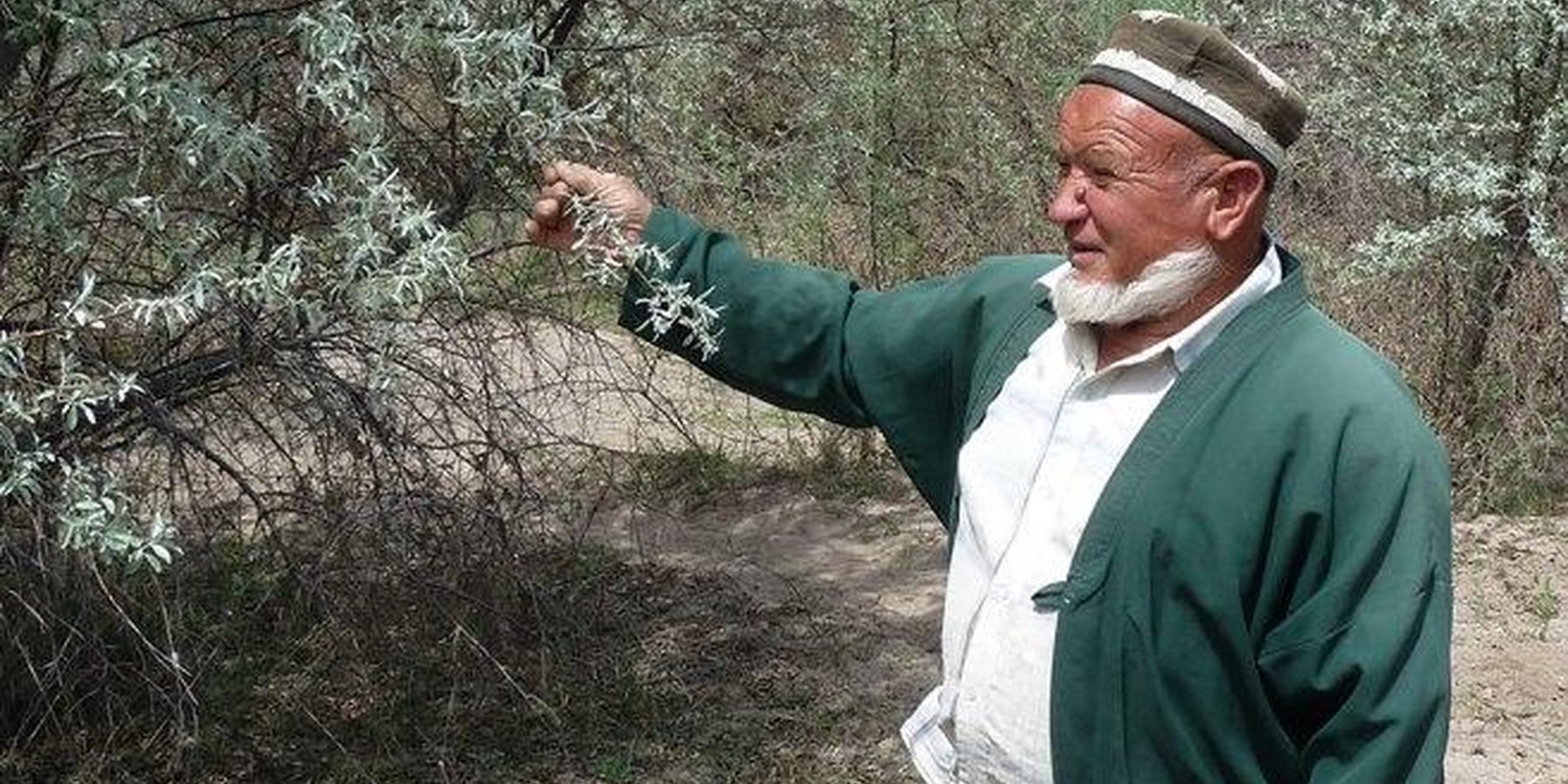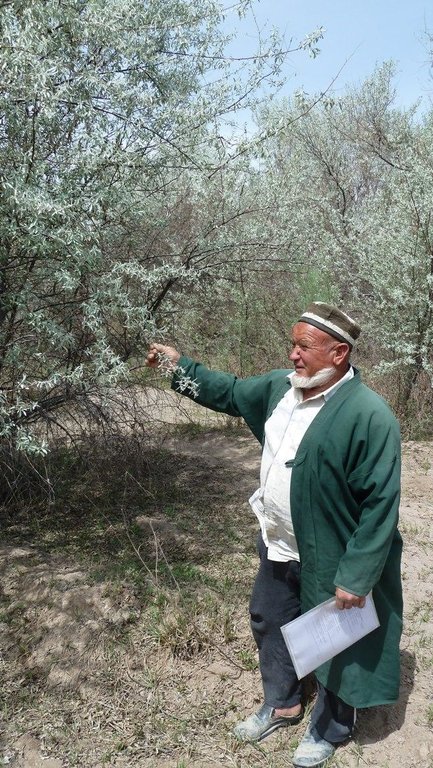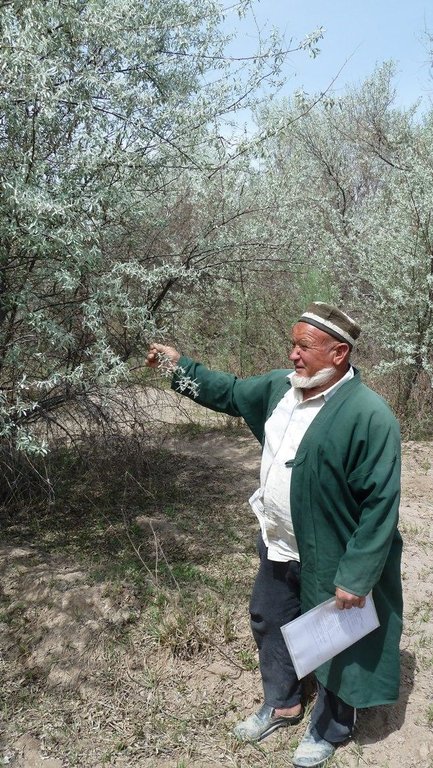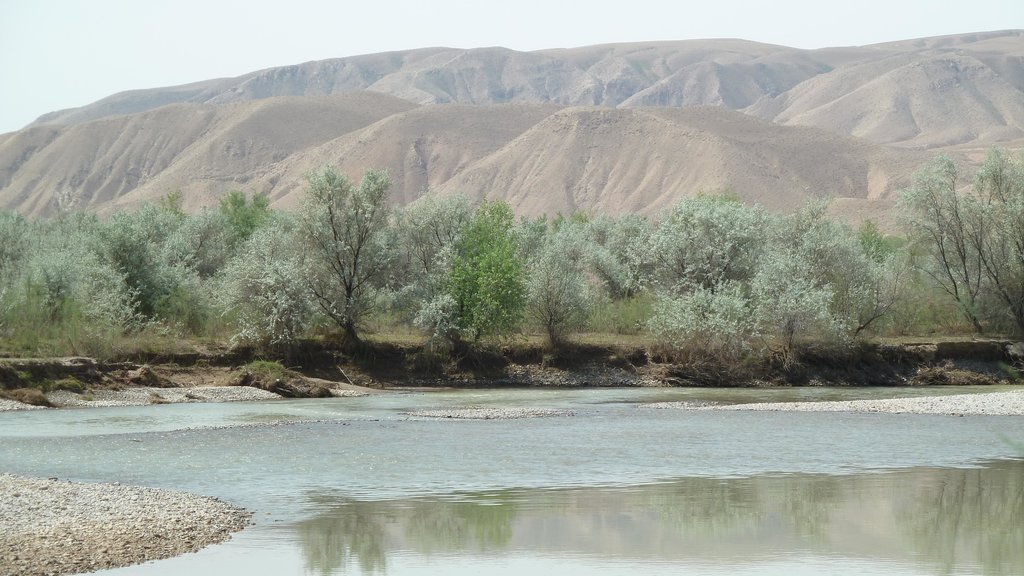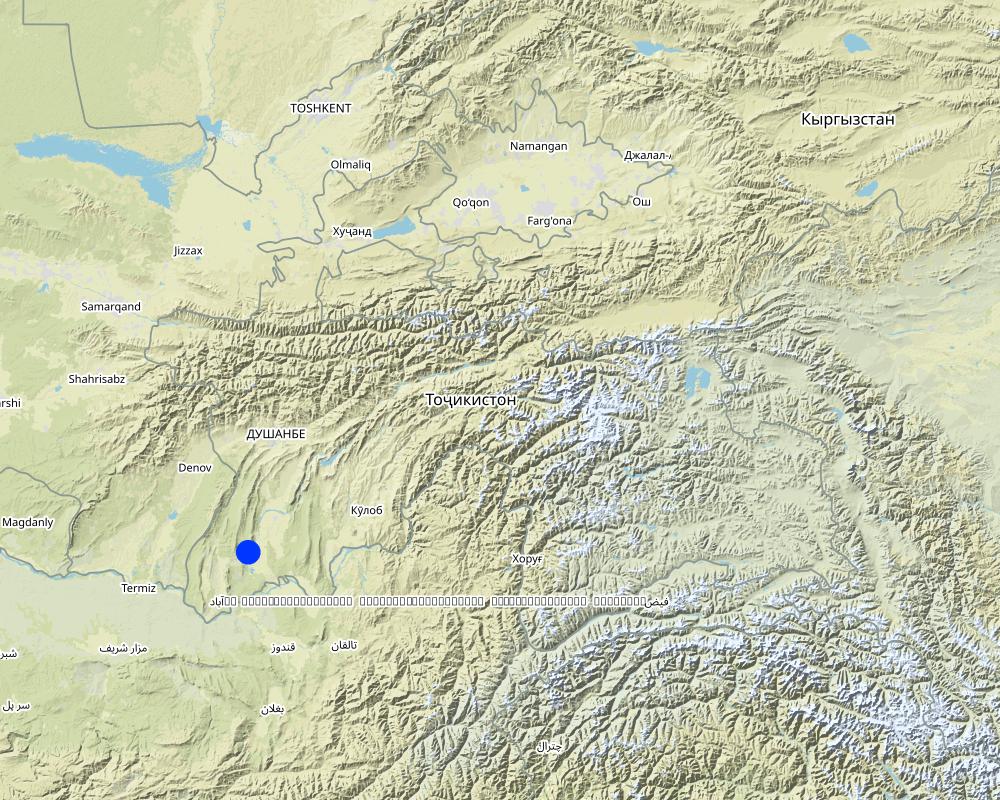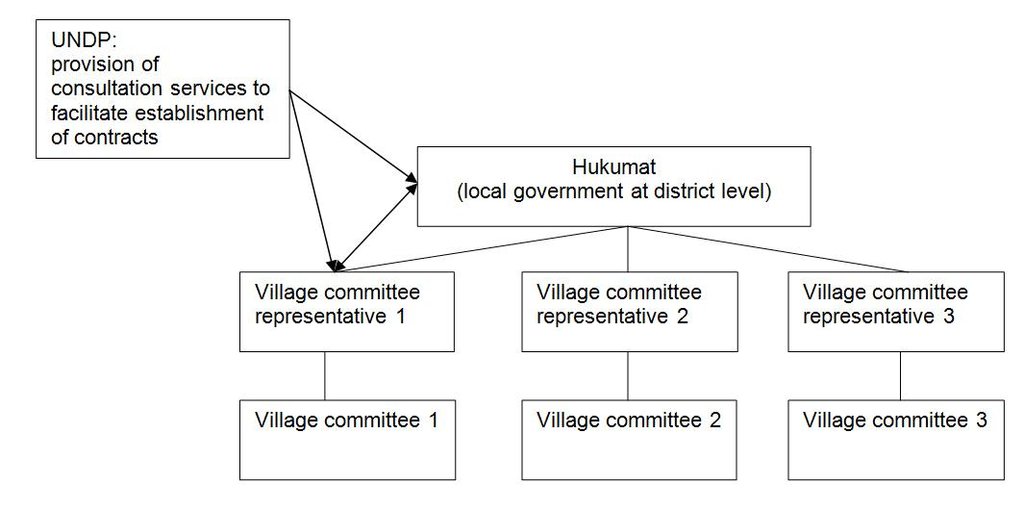Tugai forest management through village committees [ຕາຈິກິສະຕານ]
- ການສ້າງ:
- ປັບປູງ:
- ຜູ້ສັງລວມຂໍ້ມູນ: Firdavs Faizulloev
- ບັນນາທິການ: –
- ຜູ້ທົບທວນຄືນ: David Streiff, Alexandra Gavilano, Joana Eichenberger
approaches_2441 - ຕາຈິກິສະຕານ
ເບິ່ງພາກສ່ວນ
ຂະຫຍາຍທັງໝົດ ຍຸບທັງໝົດ1. ຂໍ້ມູນທົ່ວໄປ
1.2 ລາຍລະອຽດ ການຕິດຕໍ່ ຂອງບຸກຄົນທີ່ຊັບພະຍາກອນ ແລະ ສະຖາບັນ ການມີສ່ວນຮ່ວມ ໃນການປະເມີນຜົນ ແລະ ເອກະສານ ຂອງວິທີທາງ
ຜູ້ຊ່ຽວຊານ ດ້ານການຄຸ້ມຄອງ ທີ່ດິນແບບຍືນຍົງ:
ຜູ້ຊ່ຽວຊານ ດ້ານການຄຸ້ມຄອງ ທີ່ດິນແບບຍືນຍົງ:
ຜູ້ຊ່ຽວຊານ ດ້ານການຄຸ້ມຄອງ ທີ່ດິນແບບຍືນຍົງ:
Abdurakhimov Najmiddin
najmiddin.abdurakhimov@undp.org
National Expert on Forestry, UNDP
Shaartuz Area Office, 2 Ziyodaliev Street, Shaartuz
ຕາຈິກິສະຕານ
ຊື່ຂອງໂຄງການ ທີ່ອໍານວຍຄວາມສະດວກ ໃນການສ້າງເອກກະສານ ຫຼື ປະເມີນດ້ານແນວທາງ (ຖ້າກ່ຽວຂ້ອງ)
Pilot Program for Climate Resilience, Tajikistan (WB / PPCR)ຊື່ຂອງ ສະຖາບັນການຈັດຕັ້ງ ທີ່ອໍານວຍຄວາມສະດວກ ໃນການສ້າງເອກກະສານ ຫຼື ປະເມີນແນວທາງ (ຖ້າກ່ຽວຂ້ອງ)
Central Asian Countries Initiative for Sustainable Land Management - Multicountry Capacity Building (CACILM - MCB) - ກີກັດຕັນຊື່ຂອງ ສະຖາບັນການຈັດຕັ້ງ ທີ່ອໍານວຍຄວາມສະດວກ ໃນການສ້າງເອກກະສານ ຫຼື ປະເມີນແນວທາງ (ຖ້າກ່ຽວຂ້ອງ)
CDE Centre for Development and Environment (CDE Centre for Development and Environment) - ສະວິດເຊີແລນຊື່ຂອງ ສະຖາບັນການຈັດຕັ້ງ ທີ່ອໍານວຍຄວາມສະດວກ ໃນການສ້າງເອກກະສານ ຫຼື ປະເມີນແນວທາງ (ຖ້າກ່ຽວຂ້ອງ)
United Nations Development Program (United Nations Development Program) - ຕາຈິກິສະຕານ1.3 ເງື່ອນໄຂ ຂອງການນໍາໃຊ້ເອກກະສານຂໍ້ມູນ ຂອງ WOCAT
ເມື່ອໃດທີ່ໄດ້ສັງລວມຂໍ້ມູນ (ຢູ່ພາກສະໜາມ)?
13/04/2011
ຜູ້ສັງລວມ ແລະ ບັນດາຜູ້ຕອບແບບສອບຖາມ ຍອມຮັບໃນເງື່ອນໄຂ ການນໍາໃຊ້ຂໍ້ມູນເອກະສານ ທີ່ສ້າງຂື້ນ ໂດຍຜ່ານ ອົງການ WOCAT:
ແມ່ນ
2. ພັນລະນາ ແນວທາງການຄຸ້ມຄອງນໍາໃຊ້ດິນແບບຍືນຍົງ
2.1 ການອະທິບາຍ ໂດຍຫຍໍ້ ຂອງວິທີທາງ
The described approach facilitates the establishment of contracts between village committees and local authorities for decentralised management of Tugai forest areas on State Reserve Land.
2.2 ການອະທິບາຍ ລາຍລະອຽດ ຂອງວິທີທາງ
ການອະທິບາຍ ລາຍລະອຽດ ຂອງວິທີທາງ:
Aims / objectives: Tugai forests are riparian forest ecosystems situated in the continental, winter-cold deserts of Central Asia. These flood plain forests are severely threatened by overexploitation for fire wood and by overgrazing. The 253 ha of Tugai forest in Nuri Vakhsh Jamoat along the Vakhsh river in southern Tajikstan were suffering due to their de facto status as open access resources. The district environmental department that was supposed to monitor the forest was unable to effectively carry out this work. Therefore the UNDP project on “Demonstrating Local Responses to Combating Land Degradation and Improving Sustainable Land Management in SW Tajikistan” saw the protection of this Tugai forest as a priority and engaged with local land users to help protect the forest.
Methods: UNDP project representatives held discussions with forest users living in villages next to to the Tugai forests, regarding the establishment of community-based forest management institutions. UNDP proposed that these institutions enter into agreement with the Hukumat (local district-level government) to protect and exclusively use well defined forest areas on nearby State Reserve Land.
Stages of implementation: As a first step, UNDP obtained permission from the Hukumat to conduct sanitary felling of dry and infected trees, to help improve the forest structure under supervision of the Jamoat (local municipality-level government). The removed tree material was distributed to schools and hospitals as fire wood. Next, a leasehold agreement was formed between a representative of each of the three village committees and the Hukumat. These leasehold agreements covered a total of 126 ha out of 253 ha of Tugai forest existing in the area and they are valid for five years. The remaining forest area, which is not under an agreement, is not threatened as it is situated on an island in the middle of a strong stream that cannot be crossed. The committee has to pay about or 1.73 USD / ha of leased forest land as a tax to the district. The tax paid is collected from contributions by members of the villages who pay for each head of cattle that they send for grazing at a cost of 1 USD / head of cattle.
Role of stakeholders: The village committees are headed by one representative who is responsible for regulating access to the forest plots. The local Jamoat supervises the activities carried out by the village committees on their respective plots. UNDP provides consulting services for the process of establishing contracts between village committees and the local authorities and is carrying out regular monitoring of the forest management activities.
2.3 ຮູບພາບຂອງແນວທາງ
2.5 ປະເທດ / ເຂດ / ສະຖານທີ່ບ່ອນທີ່ແນວທາງໄດ້ຖືກນໍາໃຊ້
ປະເທດ:
ຕາຈິກິສະຕານ
ພາກພື້ນ / ລັດ / ແຂວງ:
Khatlon
ຂໍ້ມູນເພີ່ມເຕີມຂອງສະຖານທີ່:
Nuri Vakhsh Jamoat
ຄວາມຄິດເຫັນ:
Total area of Tugai is 253 ha, of which 126 ha are under leasehold agreement (approach). The rest is still open access, but is not threatened as it is situated in the middle of a strong stream and cattle cannot access it to graze.
Map
×2.6 ວັນທີເລີ່ມຕົ້ນ ແລະ ສິ້ນສຸດ ການຈັດຕັ້ງປະຕີບັດ ວິທີທາງ
ສະແດງປີຂອງການເລີ່ມຕົ້ນ:
2009
ປີທີ່ສີ້ນສູດ (ຖ້າຢຸດບໍ່ໄດ້ນໍາໃຊ້ ວິທີທາງ):
2011
2.7 ປະເພດຂອງແນວທາງ
- ພາຍໃຕ້ໂຄງການ / ແຜນງານ
2.8 ເປົ້າໝາຍ / ຈຸດປະສົງຫຼັກ ຂອງການຈັດຕັ້ງປະຕິບັດ ວິທີທາງ
The Approach focused mainly on SLM with other activities (regulation of access for herders)
The main aim of the approach is to help prevent the degradation of Tugai forest, and the disappeareance of this threatened ecosystem, while giving the local population the chance to manage and use it in a sustainable way.
The SLM Approach addressed the following problems: uncontrolled access and degradation of Tugai forest, overgrazing, cutting of trees, no firewood resources available
2.9 ເງື່ອນໄຂອໍານວຍ ຫຼື ຂັດຂວາງການປະຕິບັດຂອງເຕັກໂນໂລຢີ / ເຕັກໂນໂລຢີການນໍາໃຊ້ຕາມແນວທາງ
ສັງຄົມ / ວັດທະນະທໍາ / ມາດຕະຖານ ແລະ ຄຸນຄ່າທາງສາສະໜາ
- ເຊື່ອງຊ້ອນ
lack of local level structures enabling collaboration between village organisations and Jamoat or Hukumat
Treatment through the SLM Approach: UNDP assistance and consulting to improve collaboration and enabling the establishment of leasehold agreements
ການກໍ່ຕັ້ງສະຖາບັນ
- ເຊື່ອງຊ້ອນ
no implementation of control and punishment measures regarding the overexploitation of Tugai forest
Treatment through the SLM Approach: clearly defined rights and responsibilities for forest users and village and local government institutions
ກ່ຽວກັບກົດໝາຍ (ສິດນໍາໃຊ້ດິນ, ສິດນໍາໃຊ້ນໍ້າ)
- ອໍານວຍ
The existing land ownership, land use rights / water rights moderately helped the approach implementation: As the land is classified as State Reserve Land, and is under the control of the forestry department within the Hukumat, the establishment of an agreement between village organisations and the Hukumat was possible.
- ເຊື່ອງຊ້ອນ
no defined forest use or management rights and responsibilities
Treatment through the SLM Approach: user agreement between village committees and district administration
ຄວາມຮູ້ກ່ຽວກັບການຄຸ້ມຄອງ ທີ່ດິນແບບຍືນຍົງ, ການເຂົ້າເຖິງການສະໜັບສະໜູນ ທາງດ້ານວິຊາການ
- ເຊື່ອງຊ້ອນ
overgrazing and overexploitation of Tugai forest for firewood
Treatment through the SLM Approach: the forest leasehold agreement defines that no cutting of trees is allowed during the first 5 years, apart from sanitary felling, and grazing is limited to a certain number of cattle
3. ການມີສ່ວນຮ່ວມ ແລະ ບົດບາດຂອງພາກສ່ວນທີ່ກ່ຽວຂ້ອງທີ່ໄດ້ມີສ່ວນຮ່ວມ
3.1 ຜູ້ມີສ່ວນຮ່ວມ ໃນວິທີທາງ ແລະ ພາລະບົດບາດ ຂອງເຂົາເຈົ້າ
- ຜູ້ນໍາໃຊ້ດິນໃນທ້ອງຖິ່ນ / ຊຸມຊົນທ້ອງຖິ່ນ
Representative of village committee and village committees
Village committees were all represented by men.
- ຜູ້ຊ່ຽວຊານ ການນຄຸ້ມຄອງ ທີ່ດິນແບບຍືນຍົງ / ທີ່ປຶກສາດ້ານກະສິກໍາ
UNDP consultants
International experts designed the broad structure/framework of the approach, but the specific agreements were designed by village representatives, Hukumat, and the UNDP consultant.
- ພະນັກງານຂັ້ນສູນກາງ (ຜູ້ວາງແຜນ, ຜູ້ສ້າງນະໂຍບາຍ)
District administration
- ອົງການຈັດຕັ້ງ ສາກົນ
UNDP
ຖ້າຫາກມີຫຼາຍພາກສ່ວນທີ່ເຂົ້າຮ່ວມ ໃຫ້ລະບຸ ອົງການທີ່ເປັນຫຼັກ ໃນການຈັດຕັ້ງປະຕິບັດ:
UNDP
3.2 ການມີສ່ວນຮ່ວມຂອງຜູ້ນໍາໃຊ້ທີ່ດິນໃນທ້ອງຖິ່ນ / ຊຸມຊົນທ້ອງຖິ່ນໃນໄລຍະທີ່ແຕກຕ່າງກັນຂອງແນວທາງ
| ການລວບລວມ ເອົາຜູ້ນໍາໃຊ້ດິນ ໃນທ້ອງຖິ່ນ / ຊຸມຊົນທ້ອງຖິ່ນ | ໃຫ້ລະບຸ ຜູ້ໃດທີ່ມີສ່ວນຮ່ວມ ໃນແຕ່ລະກິດຈະກໍາ? | |
|---|---|---|
| ການເລີ່ມຕົ້ນ / ແຮງຈູງໃຈ | ບໍ່ມີ | Consultants from UNDP initiated the approach and started discussions with villages next to the forest |
| ການວາງແຜນ | ບໍ່ມີ | |
| ການປະຕິບັດ | ການຮ່ວມມື | establishment of village committees, managing access for livestock herders |
| ຕິດຕາມກວດກາ / ການປະເມີນຜົນ | ບໍ່ມີ | monthly monitoring through UNDP consultant |
| Research | ບໍ່ມີ |
3.3 ແຜນວາດ (ຖ້າມີ)
ການອະທິບາຍ:
UNDP facilitates the process of establishing contracts between village organisations and the Hukumat for decentralised forest management.
ຜູ້ຂຽນ:
Julie Zähringer (Baumackerstr. 51)
3.4 ການຕັດສິນໃຈກ່ຽວກັບການຄັດເລືອກເຕັກໂນໂລຢີຂອງການຄຸ້ມຄອງທີ່ດິນແບບຍືນຍົງ / ເຕັກໂນໂລຢີ
ລະບຸ ຄົນທີ່ຕັດສິນໃຈ ກ່ຽວກັບການຄັດເລືອກຂອງ ເຕັກໂນໂລຢີ / ເຕັກໂນໂລຢີ ຈະໄດ້ຮັບການປະຕິບັດ:
- ຜູ້ນໍາໃຊ້ທີ່ດິນຫຼັກ, ການສະໜັບສະໜູນ ໂດຍຜູ້ຊ່ຽວຊານ ການນໍາໃຊ້ທີ່ດິນແບບຍືນຍົງ
ອະທິບາຍ:
As technology in this case we understand the implementation of the forest leasehold agreements.
Decisions on the method of implementing the SLM Technology were made by mainly by SLM specialists with consultation of land users. As technology in this case we understand the implementation of the forest leasehold agreements.
4. ການສະໜັບສະໜູນທາງດ້ານວິຊາການ, ການສ້າງຄວາມສາມາດ, ແລະ ການຈັດການຄວາມຮູ້.
4.1 ການສ້າງຄວາມສາມາດ / ການຝຶກອົບຮົມ
ຜູ້ນໍາໃຊ້ທີ່ດິນ ຫຼື ພາກສ່ວນກ່ຽວຂ້ອງອື່ນໆ ໄດ້ຮັບການຝຶກອົບຮົມບໍ່?
ແມ່ນ
ໃຫ້ລະບຸ ຜູ້ໃດທີ່ໄດ້ຮັບການຝຶກອົບຮົມ:
- ຜູ້ນໍາໃຊ້ດິນ
ຮູບແບບຂອງການຝຶກອົບຮົມ:
- ກອງປະຊຸມ
ໃນຫົວຂໍ້:
forest conservation, sustainable grazing management, sanitary cutting
4.2 ການບໍລິການໃຫ້ຄໍາປຶກສາ
ເຮັດຜູ້ໃຊ້ທີ່ດິນມີການເຂົ້າເຖິງການບໍລິການໃຫ້ຄໍາປຶກສາ?
ແມ່ນ
ອະທິບາຍ / ຄວາມຄິດເຫັນ:
Advisory service is quite adequate to ensure the continuation of land conservation activities; The forest leasehold agreements were established for a duration of 5 years. After this, the Hukumat should be in an adequate position to renew or adjust those agreements if necessary.
4.3 ສະຖາບັນການສ້າງຄວາມເຂັ້ມແຂງ (ການພັດທະນາອົງການຈັດຕັ້ງ)
ສະຖາບັນ ໄດ້ຮັບການສ້າງຕັ້ງຂື້ນ ຫຼື ໄດ້ຮັບການສ້າງຄວາມເຂັ້ມແຂງ ໂດຍການຈັດຕັ້ງປະຕິບັດ ວິທີທາງບໍ່?
- ມີ, ພໍສົມຄວນ
ລະບຸ ທາງສະຖາບັນ ໄດ້ສ້າງຄວາມເຂັ້ມແຂງ ໃນລະດັບໃດ (ຫຼາຍ):
- ທ້ອງຖິ່ນ
ລະບຸ ປະເພດ ຂອງສະໜັບສະໜູນ:
- ການສ້າງຄວາມອາດສາມາດ / ການຝຶກອົບຮົມ
ໃຫ້ລາຍລະອຽດເພີ່ມເຕີມ:
Jamoat
4.4 ຕິດຕາມກວດກາ ແລະ ປະເມີນຜົນ
ການຈັດຕັ້ງປະຕິບັດ ວິທີທາງ ໄດ້ມີການປະເມີນຜົນ ແລະ ຕິດຕາມບໍ?
ແມ່ນ
ຄວາມຄິດເຫັນ:
bio-physical aspects were regular monitored by project staff through measurements; indicators: plant and bird species, number of cases connected with illegal cutting of trees
bio-physical aspects were regular monitored by project staff through observations; indicators: visual assessment of rehabilitation of grass, bushes and trees, number of wild animals and birds
There were no changes in the Approach as a result of monitoring and evaluation: None
There were no changes in the Technology as a result of monitoring and evaluation: None
4.5 ການຄົ້ນຄວ້າ
ນີ້້ແມ່ນສ່ວນໜຶ່ງ ການຄົ້ນຄວ້າ ຂອງວິທີທາງບໍ່?
ແມ່ນ
ລະບຸ ຫົວຂໍ້:
- ລະບົບນິເວດ
ໃຫ້ຂໍ້ມູນ ເພີ່ມເຕີມ ແລະ ກໍານົດ ຜູ້ໃດເຮັດການຄົ້ນຄວ້າ:
Studies about presence of plant and bird species
5. ການສະໜັບສະໜູນທາງດ້ານການເງິນ ແລະ ອຸປະກອນຈາກພາຍນອກ
5.1 ງົບປະມານປະຈໍາປີ ສໍາລັບວິທີທາງ ຂອງການຄຸ້ມຄອງ ທີ່ດິນແບບຍືນຍົງ
ຄໍາເຫັນ (ຕົວຢ່າງ: ແຫຼ່ງຂໍ້ມູນຫຼັກ ຂອງການສະໜອງທຶນ / ຜູ້ໃຫ້ທຶນທີ່ສໍາຄັນ):
Approach costs were met by the following donors: international (UNDP): 100.0%
5.2 ການສະໜັບສະໜູນ ທາງດ້ານການເງິນ / ອຸປະກອນ ສະໜອງໃຫ້ແກ່ຜູ້ນໍາທີ່ດິນ
ຜູ້ນໍາໃຊ້ດິນ ໄດ້ຮັບການສະໜັບສະໜູນ ທາງດ້ານ ການເງິນ / ອຸປະກອນ ໃນການຈັດຕັ້ງປະຕິບັດ ເຕັກໂນໂລຢີບໍ?
ບໍ່ແມ່ນ
5.3 ເງິນສົມທົບສໍາລັບການນໍາໃຊ້ສະເພາະປັດໃຈຂາເຂົ້າໃນການຜະລີດກະສິກໍາ (ລວມທັງແຮງງານ)
- ກະສິກໍາ
| ໃຫ້ລະບຸໄດ້ຮັບການສະໜັບສະໜູນປັດໃຈຂາເຂົ້າຫຍັງແດ່ | ທີ່ຂອບເຂດ | ລະບຸ ການອຸດໜູນ |
|---|---|---|
| ງົບປະມານເຕັມສ່ວນ | seeds for riverbank afforestation | |
- ອື່ນໆ
| ອື່ນໆ (ລະບຸ) | ທີ່ຂອບເຂດ | ລະບຸ ການອຸດໜູນ |
|---|---|---|
| costs associated with training and meetings | ງົບປະມານເຕັມສ່ວນ |
ຖ້າແຮງງານ ຂອງຜູ້ນໍາໃຊ້ດິນ ໄດ້ຮັບການສະໜັບສະໜູນ ປັດໃຈຂາເຂົ້າ, ແມ່ນບໍ່:
- ການອາສາ
5.4 ສິນເຊື່ອ
ໄດ້ປ່ອຍສິນເຊື່ອ ສະໜອງໃຫ້ພາຍໃຕ້ ວິທີການສໍາລັບກິດຈະກໍາ ການຄຸ້ມຄອງ ທີ່ດິນແບບຍືນນຍົງບໍ່?
ບໍ່ແມ່ນ
5.5 ສິ່ງຈູງໃຈ ຫຼື ເຄື່ອງມືອື່ນໆ
ການສົ່ງເສີມ ຈັດຕັ້ງປະຕິບັດ ເຕັກໂນໂລຢີ ໃນການຄຸ້ມຄອງ ດິນແບບຍືນຍົງ ໄດ້ສະໜອງສິ່ງກະຕຸກຊຸກຍູ້ບໍ່?
ແມ່ນ
ຖ້າແມ່ນ, ໃຫ້ລະບຸ:
Jamoat
6. ວິເຄາະຜົນກະທົບ ແລະ ສັງລວມບັນຫາ
6.1 ຜົນກະທົບຂອງແນວທາງ
ການຈັດຕັ້ງປະຕິບັດ ວິທີທາງ ສາມາດຊ່ວຍຜູ້ນໍາໃຊ້ທີ່ດິນ ໃນການຈັດຕັ້ງປະຕິບັດ ແລະ ບໍາລຸງຮັກສາ ເຕັກໂນໂລຢີ ການຄຸ້ມຄອງ ທີ່ດິນແບບຍືນຍົງໄດ້ບໍ?
- ບໍ່
- ມີ, ໜ້ອຍໜຶ່ງ
- ມີ, ພໍສົມຄວນ
- ມີ, ຫຼາຍ
protection of biodiversity, improved fodder availability
ການຈັດຕັ້ງປະຕິບັດ ວິທີທາງ ສາມາດສ້າງຄວາມເຂັ້ມແຂງ ທາງສັງຄົມ ແລະ ເສດຖະກິດບໍ່?
- ບໍ່
- ມີ, ໜ້ອຍໜຶ່ງ
- ມີ, ພໍສົມຄວນ
- ມີ, ຫຼາຍ
Did other land users / projects adopt the Approach?
- ບໍ່
- ມີ, ໜ້ອຍໜຶ່ງ
- ມີ, ພໍສົມຄວນ
- ມີ, ຫຼາຍ
the experience has not yet been disseminated
Did the Approach lead to improved livelihoods / human well-being?
- ບໍ່
- ມີ, ໜ້ອຍໜຶ່ງ
- ມີ, ພໍສົມຄວນ
- ມີ, ຫຼາຍ
improved pasture quality within the forest plots and high aesthetic value of the forest
Did the Approach help to alleviate poverty?
- ບໍ່
- ມີ, ໜ້ອຍໜຶ່ງ
- ມີ, ພໍສົມຄວນ
- ມີ, ຫຼາຍ
6.2 ແຮງຈູງໃຈຫຼັກຂອງຜູ້ນໍາໃຊ້ທີ່ດິນໃນການປະຕິບັດການຄຸ້ມຄອງທີ່ດິນແບບຍືນຍົງ
- ກົດລະບຽບແລະລະບຽບການ (ລະອຽດ) / ການບັງຄັບໃຊ້
- ຄວາມຮັບຮູ້ ທາງສີ່ງແວດລ້ອມ
- ການປັບປຸງຄວາມງົດງາມ
- well-being and livelihoods improvement
6.3 ຄວາມຍືນຍົງຂອງກິດຈະກໍາວິທີທາງ
ຜູ້ນໍາໃຊ້ ທີ່ດິນ ສາມາດສືບຕໍ່ ການຈັດຕັ້ງປະຕິບັດ ຜ່ານວິທີທາງໄດ້ບໍ່ (ໂດຍປາດສະຈາກ ການຊ່ວຍເຫຼືອ ຈາກພາກສ່ວນພາຍນອກ)?
- ແມ່ນ
ຖ້າ ໄດ້, ອະທິບາຍເຫດຜົນ:
The land users should now be in a position to renew contracts with the Hukumat.
6.4 ຈຸດແຂງ / ຂໍ້ດີ ຂອງວິທີທາງ
| ຈຸດແຂງ / ຂໍ້ດີ / ໂອກາດໃນການນໍາໃຊ້ທີ່ດິນ |
|---|
| Protection of plant and animal diversity |
| Increasing the capacity of the community on legal issues |
| Aesthetic value of the beauty of this landscape - quote from land user responsible for a 41 ha forest plot 'Every morning when I open the window and I see the beautiful landscape of the Tugai forest I feel happy' |
| ຈຸດແຂງ / ຈຸດດີ / ໂອກາດ ຈາກທັດສະນະຂອງຜູ້ປ້ອນຂໍ້ມູນ ຫຼື ບຸກຄົນສຳຄັນ |
|---|
|
Protection of a highly endangered ecosystem, while allowing for improvement of grazing for local herders |
6.5 ຈຸດອ່ອນ / ຂໍ້ເສຍຂອງແນວທາງ ແລະ ວິທີການແກ້ໄຂໃຫ້ເຂົາເຈົ້າ
| ຈຸດອ່ອນ / ຂໍ້ເສຍ / ຄວາມສ່ຽງໃນມູມມອງຂອງຜູ້ນໍາໃຊ້ທີ່ດິນ | ມີວິທີການແກ້ໄຂຄືແນວໃດ? |
|---|---|
| no tenure security as the government could sell off the land at any time | issue land user certificates |
7. ເອກກະສານອ້າງອີງ ແລະ ຂໍ້ມູນການເຊື່ອມໂຍງ
7.1 ວິທີການ / ແຫຼ່ງຂໍ້ມູນ
- ການໄປຢ້ຽມຢາມພາກສະໜາມ, ການສໍາຫຼວດພາກສະໜາມ
- ການສໍາພາດ ຜູ້ນໍາໃຊ້ທີ່ດິນ
ຂໍ້ມູນການເຊື່ອມຕໍ່ ແລະ ເນື້ອໃນ
ຂະຫຍາຍທັງໝົດ ຍຸບທັງໝົດການເຊື່ອມຕໍ່
ບໍ່ມີຂໍ້ມູນການເຊື່ອມຕໍ່
ເນື້ອໃນ
ບໍ່ມີເນື້ອໃນ


